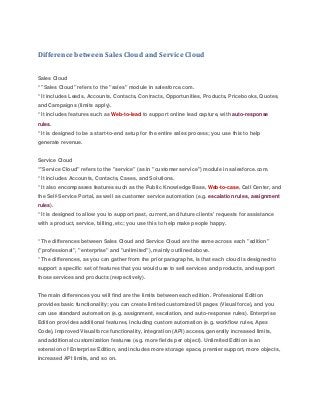Difference between sales cloud and service cloud
•Als DOCX, PDF herunterladen•
11 gefällt mir•51,378 views
Melden
Teilen
Melden
Teilen

Empfohlen
Empfohlen
Weitere ähnliche Inhalte
Empfohlen
Empfohlen (20)
Product Design Trends in 2024 | Teenage Engineerings

Product Design Trends in 2024 | Teenage Engineerings
How Race, Age and Gender Shape Attitudes Towards Mental Health

How Race, Age and Gender Shape Attitudes Towards Mental Health
AI Trends in Creative Operations 2024 by Artwork Flow.pdf

AI Trends in Creative Operations 2024 by Artwork Flow.pdf
Content Methodology: A Best Practices Report (Webinar)

Content Methodology: A Best Practices Report (Webinar)
How to Prepare For a Successful Job Search for 2024

How to Prepare For a Successful Job Search for 2024
Social Media Marketing Trends 2024 // The Global Indie Insights

Social Media Marketing Trends 2024 // The Global Indie Insights
Trends In Paid Search: Navigating The Digital Landscape In 2024

Trends In Paid Search: Navigating The Digital Landscape In 2024
5 Public speaking tips from TED - Visualized summary

5 Public speaking tips from TED - Visualized summary
Google's Just Not That Into You: Understanding Core Updates & Search Intent

Google's Just Not That Into You: Understanding Core Updates & Search Intent
The six step guide to practical project management

The six step guide to practical project management
Beginners Guide to TikTok for Search - Rachel Pearson - We are Tilt __ Bright...

Beginners Guide to TikTok for Search - Rachel Pearson - We are Tilt __ Bright...
Difference between sales cloud and service cloud
- 1. Difference between Sales Cloud and Service Cloud Sales Cloud * "Sales Cloud" refers to the "sales" module in salesforce.com. * It includes Leads, Accounts, Contacts, Contracts, Opportunities, Products, Pricebooks, Quotes, and Campaigns (limits apply). * It includes features such as Web-to-lead to support online lead capture, with auto-response rules. * It is designed to be a start-to-end setup for the entire sales process; you use this to help generate revenue. Service Cloud *"Service Cloud" refers to the "service" (as in "customer service") module in salesforce.com. * It includes Accounts, Contacts, Cases, and Solutions. * It also encompasses features such as the Public Knowledge Base, Web-to-case, Call Center, and the Self-Service Portal, as well as customer service automation (e.g. escalation rules, assignment rules). * It is designed to allow you to support past, current, and future clients' requests for assistance with a product, service, billing, etc; you use this to help make people happy. * The differences between Sales Cloud and Service Cloud are the same across each "edition" ("professional", "enterprise" and "unlimited"), mainly outlined above. * The differences, as you can gather from the prior paragraphs, is that each cloud is designed to support a specific set of features that you would use to sell services and products, and support those services and products (respectively). The main differences you will find are the limits between each edition. Professional Edition provides basic functionality; you can create limited customized UI pages (Visualforce), and you can use standard automation (e.g. assignment, escalation, and auto-response rules). Enterprise Edition provides additional features, including custom automation (e.g. workflow rules, Apex Code), improved Visualforce functionality, integration (API) access, generally increased limits, and additional customization features (e.g. more fields per object). Unlimited Edition is an extension of Enterprise Edition, and includes more storage space, premier support, more objects, increased API limits, and so on.